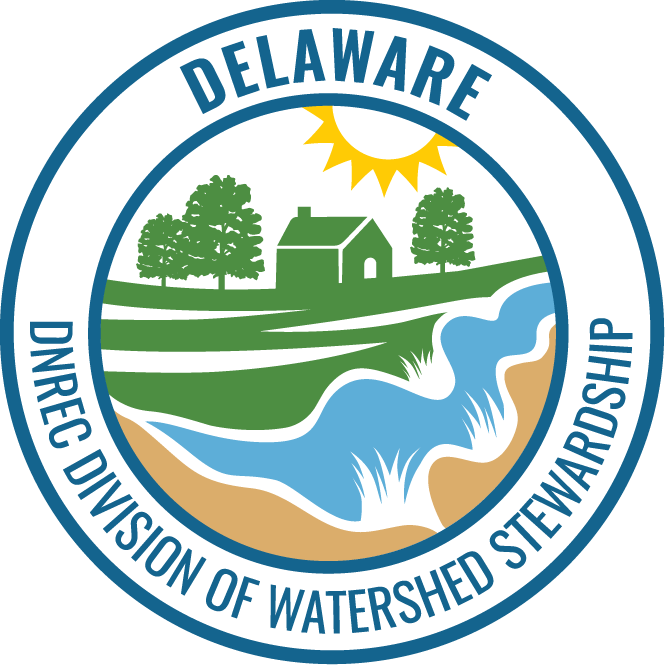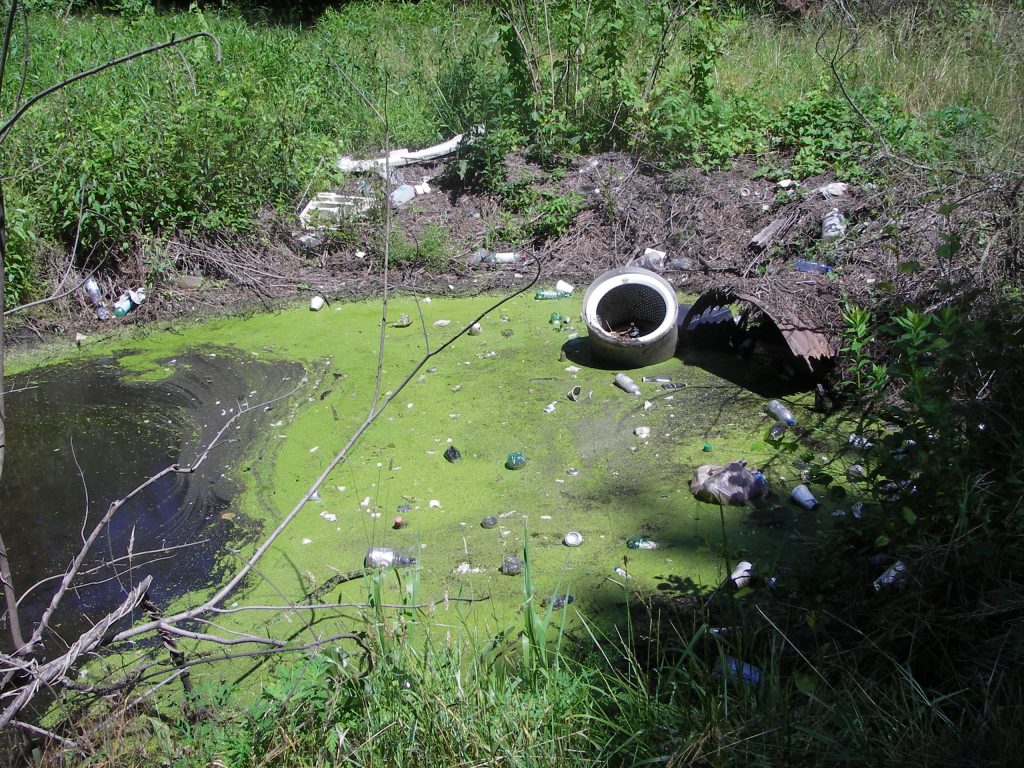
Facebook Twitter Instagram YouTube
Written on: July 13th, 2022 in Education and Outreach
By Ashley Cole, DNREC’s Wetland Monitoring and Assessment Program
This summer I’ve had the amazing opportunity to work with DNREC’s Department of Watershed Stewardship, specifically their Wetland Monitoring and Assessment Program. I was very excited to get outdoors, see wild places no one has seen before, and keep our wetlands healthy. I thought these wetlands would be mostly free of trash based on how far away they were from where people would be. However, upon our first site visit of the season, all the way down in the Pocomoke watershed, I noticed the amount of trash that we found seemingly in the middle of nowhere. Our phones had no service and we were several hundred meters into the woods. How could trash have gotten there? I was shocked to find anything from candy wrappers to Royal Farms chicken boxes, to even old plastic soda bottles and cans. Seeing all this trash made me realize the damaging effects of littering and not disposing of trash properly. We all know that most waste leads to the ocean or other waterways, but to a wetland in the middle of the woods? Seems like there needs to be a change. As humans we often think that our small decisions have no actual impact on the environment. That if one person decides to do the right thing, it won’t make that big of an impact in the end. But believe it or not it can. All this trash that is being pushed into our wetlands came from somewhere and someone. If the trash would have been disposed of properly, it would not be in our wetlands.


The Importance of Wetlands
Wetlands play a key role in our everyday lives. Wetlands help prevent erosion of our shorelines, and help prevent flooding on the coasts as well as inland. Wetlands are home to so many important and beneficial plants, animals, and other organisms. Wetlands help remove pollutants from the water keeping our waterways clean. Wetlands also act as an air filter, grabbing CO2 and other air pollutants, like greenhouse gasses out of the atmosphere. As you can see, wetlands play a vital role in a healthy everyday life. But if trash keeps ending up in our wetlands, these important services will be diminished or eliminated. Wetlands choked with waste can hardly serve as good wildlife habitat. It is up to us to keep them clean and healthy.
The Impacts of Waste in Our Wetlands:
You might be wondering, how does a thrown-out plastic bottle, or a plastic shopping bag that end up in our wetlands cause any harm? Plastics are made up of many harmful chemicals that can be harmful to both human and animal health. When plastics are exposed to the sun they will begin to break down, the harmful chemicals will detach from the plastic and into the environment, this process is called chemical leaching. As the plastic is in nature, the plastic itself will also break down into small pieces called microplastics. Microplastics are increasingly becoming more of a threat to human and environmental health every day; it is in this form that plastics are even more dangerous and harmful. These microplastics end up in our oceans, being consumed by fish, which are then consumed by humans. Filling our ecosystems and food chains with harmful and toxic chemicals. These microplastics which leach even more harmful and concentrated chemicals can leach their chemicals into our groundwater and streams. Creating toxic drinking water for both humans and wildlife.
Other impacts humans have had on wetlands when it comes to not disposing of waste properly is by dumping waste fluids into the woods or in areas that is not seen by the general public, as an out of sight out of mind area where no one will care. Dumping harmful, and toxic substances, like oils, grease, and chemicals into the woods, has the potential to harm wildlife as they could accidentally consume it, get it on their fur or skin, or leach into the ground, poisoning the plants in which wildlife need to survive. These waste substances can also leach into the soil and down into our groundwater, once again causing a potential for harming the water quality of our drinking water, or the water quality of streams and oceans.
What You Can Do To Help:
There are many ways you can help keep our wetlands clean! One of the most impactful ways you can help decrease the amount of trash and plastics from entering our wetlands and environment is by decreasing your use of single use plastics. Fighting the war on pollution can start in the home! Before going to the grocery store, bring your own reusable bags to use instead of using the grocery store’s plastic bags. This can greatly reduce the number of plastic bags from being disposed of improperly that eventually end up in our natural areas. Decreasing the number of times, you eat at fast food restaurants who use products like styrofoam cups and food containers can also play a beneficial role in lowering the amount of trash in our wetlands. When purchasing soft drinks, try to find a store that allows you to fill up a reusable cup you had from home, rather than using a plastic cup they have in the store.
Of course, always disposing of your trash responsibly is a big one. Don’t litter and just leave your trash where it is. This is one of the main causes of how trash is ending up in wetlands. Trash on the ground can move into wetlands during storms due to runoff caused by rain or wind. By disposing of your trash properly, it will ensure that the trash is contained and taken care of responsibly. Another way you can help keep wetlands clean is by recycling the correct items that can be recycled. Always check the labels of plastics, papers, carboards, etc., that you are considering recycling. There are often different codes or ways in which an item can be recycled and identify if they can be recycled at all. By checking these labels and recycling properly you can help prevent trash and other pollutants from entering our wetlands.
When recycling, it is important to make sure whatever you are recycling is free from any left-over food debris and is cleaned out. When placing your recyclable items into your recycle bin or whatever you use to hold your recyclables, make sure that they are placed loosely into the bin and not bagged, as plastic bags cannot be recycled. Recycling is a very important effort that we can try to contribute to make Delaware and our planet a healthier, cleaner place. Recycling greatly reduces greenhouse gas emissions from entering our atmosphere, it conserves our natural resources and energy, and it helps keep our planet clean from not placing even more trash into already full landfills and trash dumps.
There are also plenty of useful and innovative ways you can reuse recyclables before putting them into the recycling bin. This is where their recycling codes come into play. On many different plastics and recyclable items, there will be a recycling symbol on the back, bottom, or one of the sides. Inside of this symbol will be a number. This number corresponds to the type of chemicals that were used to create this plastic. Some chemicals are toxic and not healthy to use for human consumption after its first use, and others can be safely used more than once. Some ways you can reuse plastics is by finding new ways they can be useful. For example, you can take a plastic liter bottle, cut it in half, and use the plastic as a planter. If you have young kids, there are plenty of cool arts and crafts ideas you can do, that uses left over plastic containers. The possibilities are endless! And you have created something new out of something that would have just been throw away.
Another way you can help protect our wetlands and keep them clean is by getting involved. Volunteer for cleanups around your city or beaches, contact state environmental agencies, like DNREC, to see how you can help. If you live near a shoreline, consider having a living shoreline. You can use non-toxic, unbleached, and phosphate free cleaning supplies, detergents, and lawn care products to prevent toxic chemicals from entering into our waterways and wetlands. Or if you see something, say something. If you see someone liter, say something to them and educate them on why they shouldn’t liter. With these steps in mind, you can become a wetland steward and feel good about the positive impact you are having on the cleanliness and health of Delaware’s wetlands!
For more information on recycling, please visit DNREC’s “How to Recycle Guide” and other useful information.